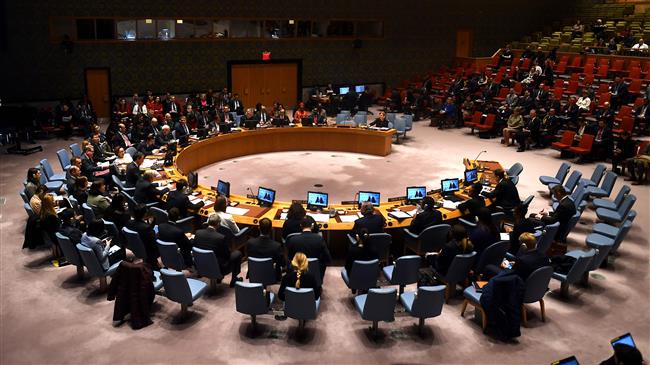Iran to ‘decisively’ counter potential arms embargo extension
Foreign Ministry spokesman Abbas Mousavi says Iran will serve a “decisive response” to a potential extension of an arms embargo against the country that is legally bound to expire under its nuclear agreement with world powers.

“Iran will serve an appropriate and decisive response to such a measure,” Mousavi told a press conference in Tehran on Monday, referring to the potential submission of Iran’s case to the United Nations Security Council and the likely extension of the embargo.
He, however, hoped for such a prospect not to come about, adding, “We are waiting to see the direction in which the circumstances are going to develop, and will then act based on them and deliver a response.”
The United States has expressed its resolve to have the embargo on the sales of conventional weapons to Iran prolonged, although the ban is to expire by October under the 2015 nuclear deal. Washington is legally prohibited from taking such action as it left the deal in May 2018.
Mousavi noted that the US was no longer a party to the agreement that is officially known as the Joint Comprehensive Plan of Action (JCPOA).
“The US has a historical record of non-commitment to its international obligations,” he said. “[Its actions concerning] the JCPOA manifest one of its unilateral approaches, which showed it is a regime that does not believe in the rule of law and international regulations, and is the biggest violator of those regulations.”
‘US approach disturbs intl. order’
The US’s current attitude “is dangerous and disturbs the international order,” the spokesman said.
Washington sought to negate the nuclear accord’s achievements, including the expected expiration of the arms embargo, by illegally withdrawing from the deal, he noted.
However, the Islamic Republic neutralized the US’s policy of “maximum pressure” through the resistance that was put up by the Iranian nation, the country’s policy of “resistive economy,” and its cooperation with its traditional partners and neighbors, Mousavi said.
Tehran is “certain” that Washington would fall short of its objective because “the world is far from likely to cave in to the US’s bullying,” he stated.
US interference with regional security
The Islamic Republic “essentially does not recognize” the US’s regional presence, especially its military presence in the Persian Gulf, and “considers it a means of interference with Iran and the region’s security and stability,” the official said.
He cited various cases of dangerous and provocative maneuvering by American military vessels in the waters that have warranted words of caution by Iranian military forces.
The Islamic Republic is prepared to “deliver necessary warnings in serious cases” to the US through both Iran’s mission to the UN and the Swiss Embassy in Tehran that represents Washington’s’ interests.
Germany’s support for 1980s gas attacks
Mousavi separately addressed the issue of Iran’s ongoing legal actions against Germany and other countries that assisted the regime of Saddam Hussein with its chemical attacks against Iran during the former Iraqi dictator’s 1980-88 war on the Islamic Republic.
“Germany’s support for Saddam and its sales of chemical arms to him against Iran are clear and self-evident issues that have been proven too,” Mousavi said.
The Germans share a large part of Saddams’ atrocities against the Iranian armed forces and people as well as the people of Iraq, especially the Iraqi Kurds, he noted.
“What we expect is for the perpetrators to be tried and for the German government to officially apologize to the Iranian and Iraqi peoples,” the official noted.
The US, the UK, Germany, Italy, and Holland were among the countries providing Saddam’s Ba’athist Iraq with the equipment and material to build chemical weapons.
Iraq made the most of its acquisitions by launching over 350 large-scale gas attacks along the Iran-Iraq border during the war.
The assaults left Iran with over 107,000 victims, 2,600 of whom died at the time. Over 45,000 others were left in permanent need of relief aid provided by Iran’s Veterans and War Victims Foundation.
The spokesman also referred to Germany’s recent blacklisting of Hezbollah, describing the move as a token of Berlin’s support for the Israeli regime.
By labeling the Lebanese resistance movement in such a way, Germany “is repaying its historic debt to the Zionists,” he said, suggesting that Berlin was trying to make up for Hitler’s massacre of Jews by currying favor with Tel Aviv.
However, he added, the German government should know that such actions are sure to be followed by the reactions of the world’s Muslims as Hezbollah is a “mature, deep-seated, and strong party that is integrated into the [Lebanese] government, parliament, and nation.”
Therefore, such actions on the part of Berlin are “strange and unnatural,” Mousavi said.
Iran wary of Daesh revival in Iraq
The spokesman, meanwhile, referred to the recent deadly attacks by the remnants of the Takfiri terror group of Daesh in Iraq against the Arab country’s Popular Mobilization Units (PMU) or Hashd al-Sha’abi anti-terror force.
He then suggested that the terrorist outfit was being given a new lease of life by the US that has been mandated by the Iraqi parliament to leave the country.
“The Americans are under pressure from the Iraqi people [to leave] and are seeking to prevent their exit or delay it through such actions and reinforcing Daesh,” Mousavi said.







